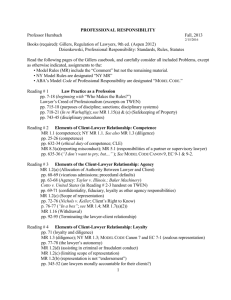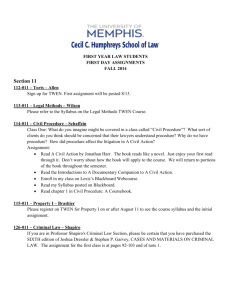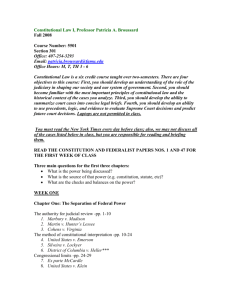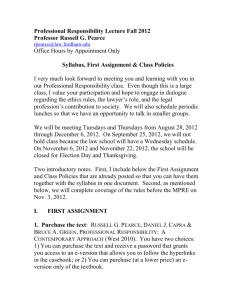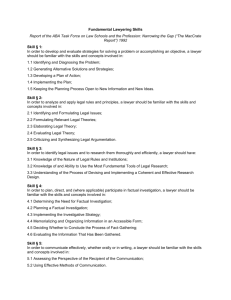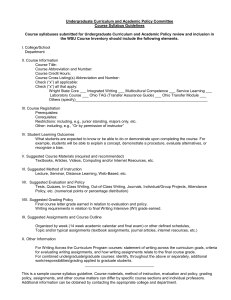Syllabus - University of Wisconsin Law School
advertisement
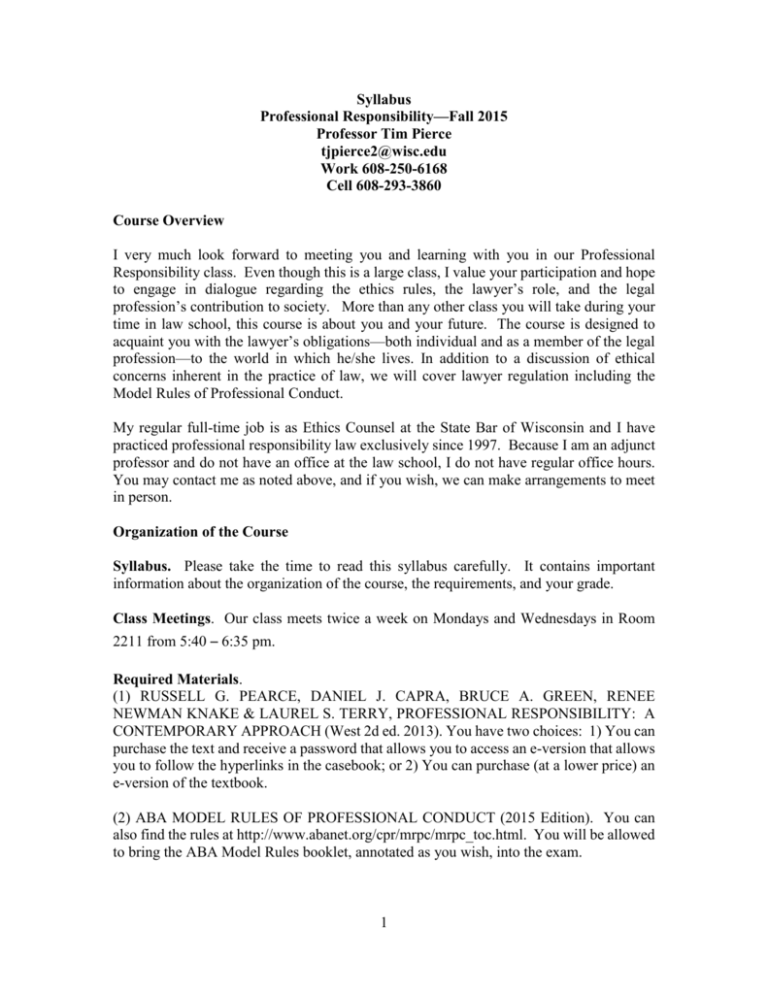
Syllabus Professional Responsibility—Fall 2015 Professor Tim Pierce tjpierce2@wisc.edu Work 608-250-6168 Cell 608-293-3860 Course Overview I very much look forward to meeting you and learning with you in our Professional Responsibility class. Even though this is a large class, I value your participation and hope to engage in dialogue regarding the ethics rules, the lawyer’s role, and the legal profession’s contribution to society. More than any other class you will take during your time in law school, this course is about you and your future. The course is designed to acquaint you with the lawyer’s obligations—both individual and as a member of the legal profession—to the world in which he/she lives. In addition to a discussion of ethical concerns inherent in the practice of law, we will cover lawyer regulation including the Model Rules of Professional Conduct. My regular full-time job is as Ethics Counsel at the State Bar of Wisconsin and I have practiced professional responsibility law exclusively since 1997. Because I am an adjunct professor and do not have an office at the law school, I do not have regular office hours. You may contact me as noted above, and if you wish, we can make arrangements to meet in person. Organization of the Course Syllabus. Please take the time to read this syllabus carefully. It contains important information about the organization of the course, the requirements, and your grade. Class Meetings. Our class meets twice a week on Mondays and Wednesdays in Room 2211 from 5:40 – 6:35 pm. Required Materials. (1) RUSSELL G. PEARCE, DANIEL J. CAPRA, BRUCE A. GREEN, RENEE NEWMAN KNAKE & LAUREL S. TERRY, PROFESSIONAL RESPONSIBILITY: A CONTEMPORARY APPROACH (West 2d ed. 2013). You have two choices: 1) You can purchase the text and receive a password that allows you to access an e-version that allows you to follow the hyperlinks in the casebook; or 2) You can purchase (at a lower price) an e-version of the textbook. (2) ABA MODEL RULES OF PROFESSIONAL CONDUCT (2015 Edition). You can also find the rules at http://www.abanet.org/cpr/mrpc/mrpc_toc.html. You will be allowed to bring the ABA Model Rules booklet, annotated as you wish, into the exam. 1 When you see a Rule referenced in the assigned reading, you are required to read the entire Rule and Comment. Reading the entirety of cited and assigned Rules and Comments is extremely important for the exam. Most states, as does Wisconsin, base their disciplinary rules on the Model Rules and it is useful for you to become aware of state based variations on the Rules regardless of where you end up practicing. Therefore I will inform you of the differences between Wisconsin’s Rules and the Model Rules as we progress through the semester. You will, however, be tested on the Model Rules, not the Wisconsin Rules. You are also required to register for the course on TWEN. I will communicate with the class through TWEN and assigned readings for each class will be posted on the class calendar. Attendance. This is a class about your responsibilities as a professional. I expect you to fulfill those responsibilities by attending every class unless you have an excuse. I will trust you to be on your honor for your excuses. To obtain an excused absence, you must email no later than 5 pm the day before class for an anticipated absence, such as a job interview, and no later than 2 pm on the day of class for an unanticipated absence, such as a sudden illness. Depending on class size, I will take attendance or I will circulate a seating chart the second week of class and will expect you to sit in your chosen seat for the remainder of the course. Unexcused absences normally will negatively affect your grade. Class Attendance and Participation. I expect students to arrive at each class prepared to answer the quiz questions in the assigned materials (giving both an answer and the reason for the answer) and prepared to discuss other assigned materials. I will make my best effort to call upon all students equally. If you have not adequately prepared for class, you may take a pass when called upon. Taking a pass means that you will be called upon during the next class. If you are not prepared when next called upon, your grade may be lowered. Voluntary and active participation in class and demonstrated mastery of the materials may (and likely will) raise your grade. Written Assignments: You will be required to complete 3-4 written assignments during the semester. The assignments may not exceed two pages in length and you will have approximately 10 days to complete the assignment. The assignments will not receive a letter grade, but they must be turned in and they must be of acceptable quality. Failure to timely turn in a written assignment of acceptable quality will negatively affect your grade. Exceptional work on an assignment will raise your grade. Final Exam. The final exam will consist of multiple choice and possibly some true/false questions. It is not an open book exam, but you may bring your Model Rules booklet, annotated as you wish, into the exam room. The best way to prepare for the exam is to read the assigned materials, attend every class and pay attention to class discussion. I will schedule voluntary review sessions later in the semester. 2 Grade. Your grade is based primarily on the final exam, though participation in class discussion, assignments and attendance may affect your grade as discussed in this syllabus. Quizzes. Each section of assigned reading contains quiz questions which we will use for class discussion. We will not, however, likely to be able to cover each question in class, so I will post quizzes on TWEN after the materials are covered in class. I will not require you to complete the quizzes on TWEN, and hence not grade them, but I strongly encourage you to do so as a means of self-assessment. This is one of the best ways to ensure you understand the materials and are prepared for the exam. Reading Assignments We will cover the first seven chapters of the textbook and possibly some of Chapter 9 as set forth below. There will be some additional required reading materials that be posted on TWEN. I will post on TWEN the official reading assignments for each week on the class calendar. You are responsible for all of the reading listed as “required” whether we discuss it in class or not. Also, please note that when the ABA Model Rules of Professional Conduct are referenced in the casebook, you are responsible for reading the entire Rule as well as the corresponding Comments. The coverage listed below is subject to revision, and I may not assign all the pages listed below. Always check the class calendar for specific daily assignments. 1. Introducing Professionalism and Legal Ethics pp. 1-26 2. The Basic Elements of Law Practice A. B. C. D. E. Unauthorized Practice: pp. 27-60 Creating the Lawyer-Client Relationship: pp. 61-82 Ending the Lawyer-Client Relation: pp. 82-91 Competence: pp. 92-141 Allocating Decision-Making Between Lawyer and Client: pp. 142-182 3. Finding and Billing Clients A. Finding Clients: pp. 183-246 B. Billing Clients: pp. 246-312 4. The Lawyer’s Duty of Confidentiality A. Introduction: pp. 313-317 B. Attorney-Client Privilege: pp. 317-376 3 C. The Ethical Duty of Confidentiality: pp. 376-406 5. Conflicts of Interest A. Introduction: p. 407-409 B. Simultaneous Representation of Multiple Clients: pp. 410-452 C. Personal and Financial Interests of the Lawyer: pp. 453-466 D. Lawyer as Witness: pp. 466-469 E. Representation Adverse to a Former Client: pp. 469-483 F. Third Party Neutrals: pp. 483-486 G. Vicarious Disqualification: 486-502 H. Conflicts in Criminal Cases: 502-526 6. The Lawyer’s Duties to the Legal System, the Profession, and Nonclients A. B. C. D. Introduction: pp. 527-530 Duties to the Court and other Tribunals: pp. 530-596 Duties to Third Parties and to the Law: pp. 597-636 Duties to Lawyers and to the Bar: pp. 636-651 7. Special Ethical Rules: Prosecutors and Judges A. The Ethical Duties of Prosecutors: pp. 653-746 B. The Ethical Standards for Judges: pp. 746-794 8. What is the Proper Role of a Lawyer? 9. Why Do Lawyers Have Special Privileges and Responsibilities? 4

